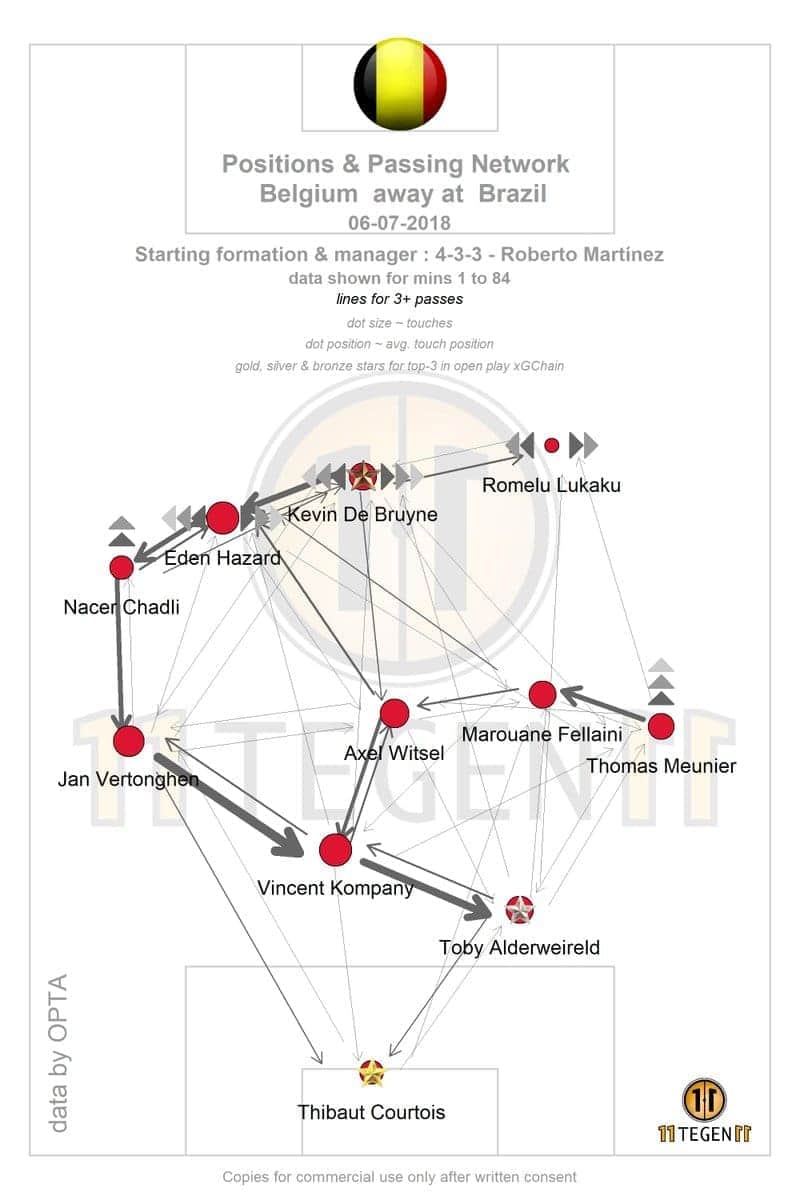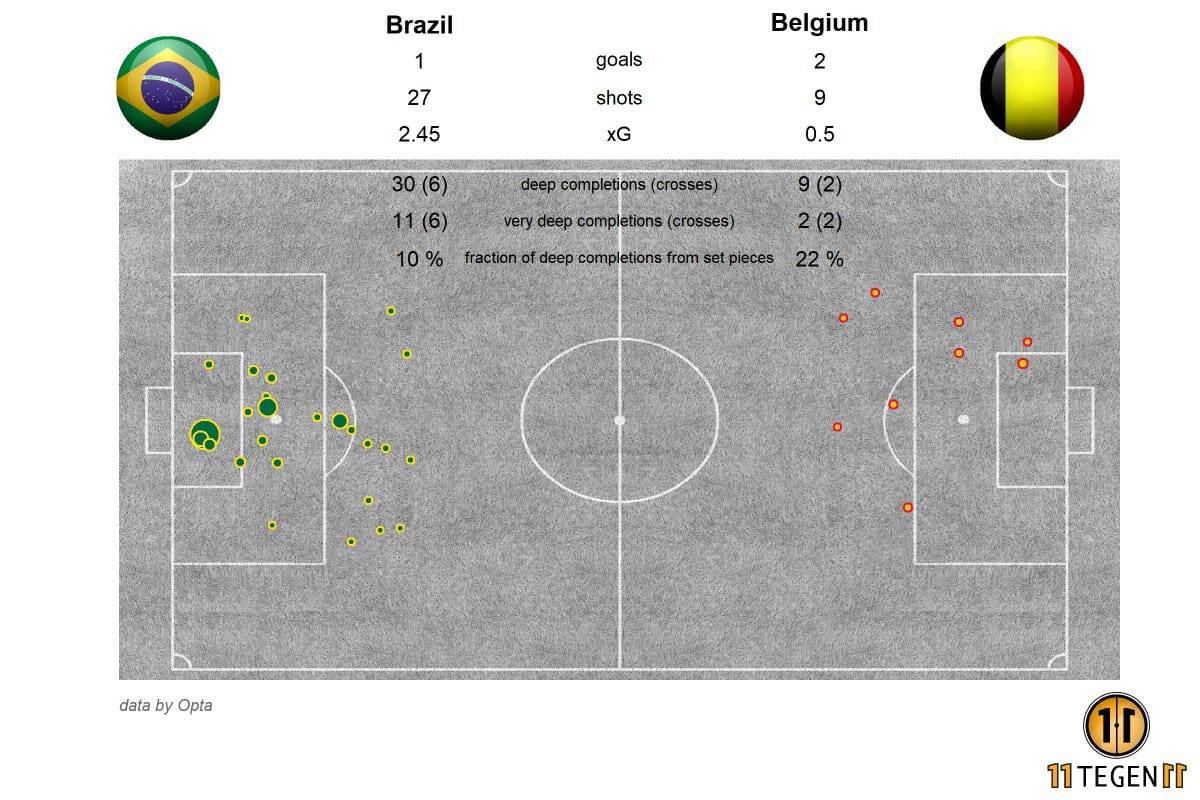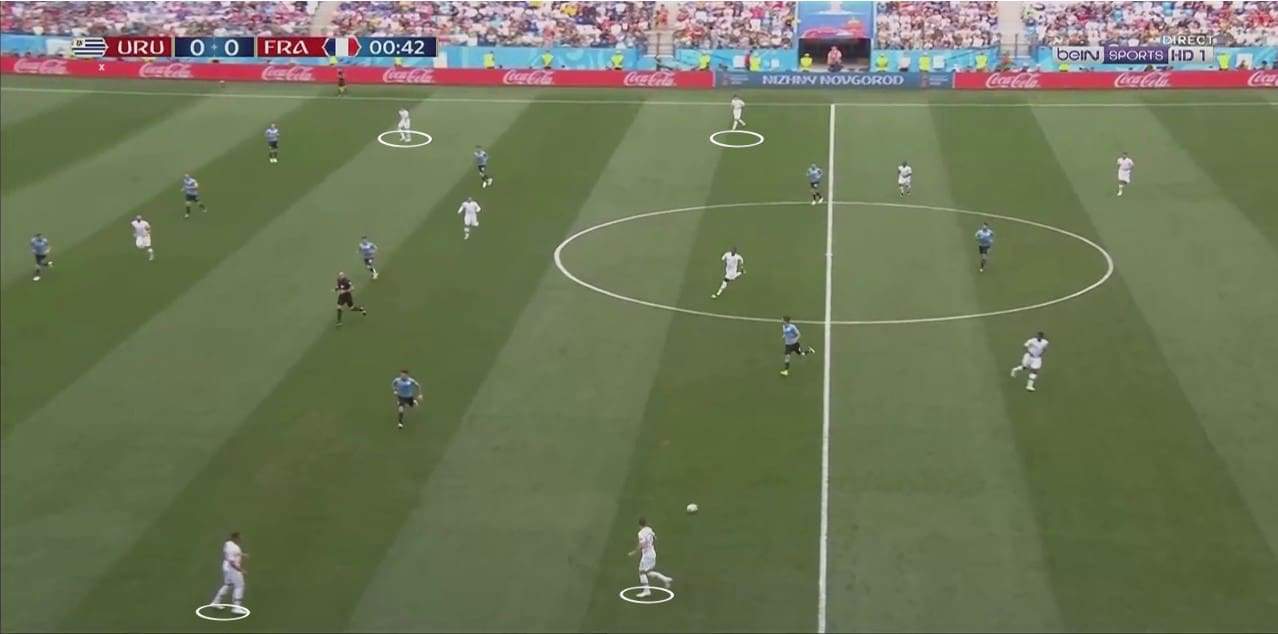The semi-final between France and Belgium should be an interesting tactical battle between two teams using two different playing styles. Didier Deschamps’ side look to be slight favourites but both squads are organised and have weapons to damage the opponent. More so than Argentina, Belgium are a strong team stocked with talent and they represent another test to see the real level France can reach under Deschamps. So, what kind of path do the French have to follow in order to reach the third World Cup final of their history, other than take care of set-pieces, as every team in Russia 2018 learned?
Playing on the counter
France showed to be comfortable when they let the opponents retaining ball possession. When it happens, Deschamps’ team is able to put their offensive threats – Kylian Mbappé and Antoine Griezmann – to play at their best, in the spots they are more suited for, i.e. in front to the opposition’s’s net.
Instead, when France were forced to control the game through possession, as they did against Uruguay, they faced troubles trying to arm forwards.
Against Belgium, an offensive, ball-oriented side built by Roberto Martínez, the French should let Eden Hazard and company run the show, trying to minimise their offensive power and being ready to throw fast and furious counter-attacks against a porous Belgian back-line.
A pivotal role into this game plan will rely on Paul Pogba and Corentin Tolisso or Blaise Matuidi’s ability to break Belgium’s pressure to go through the middle of the field.
Once Belgium’s pressure is broken, the French offensive game plan could count on the combinations between Mbappé and Griezmann up top. Should France find trouble getting the ball forward, they still can use long and direct balls to reach Olivier Giroud and then playing for the second balls in the final third of the field.
Nullify Belgium’s powerful offence
When in possession, Belgium usually lined up in a kind of 3-2-2-3 – out from a basic 3-4-3 – during this FIFA World Cup. That said, Martínez changed his formation against Brazil, stunning Tite’s side. In fact, the Spaniard switched to a very fluid 4-3-3 with a false nine in Kevin De Bruyne and with Romelu Lukaku and Eden Hazard playing as wide forwards.

Even if Martínez deployed a four-man back-line, Belgium still started playing the ball out from the back in three-man defence as right-back Thomas Meunier were pushing higher up the field through the right channel.
Combinations between Lukaku and Meunier in the right area were pivotal to Martínez’s game plan as Brazil’s left chain of Neymar, Philippe Coutinho and Marcelo simply didn’t defend over there. So, Brazil were unable to stop Belgium’s counter-attacks in the first half and their defensive structure had been manipulated with centre-back Miranda forced to face Lukaku out wide given the lack of proper defending on the left zone.
But, during this tournament, Belgium showed to have a good positional play too. They look able to occupy the middle with the central midfield duo of Axel Witsel and Marouane Fellaini; they have proper half-spaced players such as De Bruyne and Hazard; they can control the flanks with Meunier, Yannick Carrasco and Nacer Chadli.
Against Belgium, France will have to be able to build a strong defensive structure in order to handle De Bruyne and Hazard’s runs between the lines. A special role will need to be done by N’Golo Kanté who will have to provide defensive support in front of the back-line acting as a holding midfielder. For a better control of the middle and of both the half-spaces, Deschamps could line up a three-man midfield with the come back of Blaise Matuidi as left interior-midfielder.
Particularly, the French will have to deal with De Bruyne’s movements up top. In fact, moving in between the lines, the Manchester City midfielder is able to provide depth between tight defences, creating passing lines through his positioning. Should he play as false nine again, De Bruyne showed that his movement is capable of manipulate opposite’s defensive structure, opening gaps for Mertens, Lukaku, Hazard’s runs in between.
Retaining their defensive compactness will be pivotal for France to prevent Belgium getting easy access to De Bruyne, but also to Lukaku and Hazard, in their final third.
Exploiting Belgium’s defensive deficiencies
Against England, Japan and Brazil, Martínez’s side displayed their offensive power but they also showed some defensive shortcomings that France will have to exploit.
With Meunier suspended, Martínez will have to make the choice between a back three and a back four. In both cases, Belgium didn’t look good defensively. Against Brazil, they were often caught in transition. Spaces opened in their defensive structure and they could have been punished by Brazilian forwards, especially in the second half.

Belgium also seem unable to provide a decent positional sense when out of possession, lacking of both vertical and horizontal compactness.

Should Martínez line up a four-man back-line, an option is to field Thomas Vermaelen or Jan Vertonghen as full-back. It means France could generate mismatches on both flanks with Mbappé and Griezmann.
Conclusion
When you think to France vs Belgium and World Cup you think about the battle of Puebla. It happened at the Mexico World Cup 1986 when France claimed a not-so consolatory third place due to two extra time goals that settled the final 4-2 score. It was the France of the Carré magique – Platini, Giresse, Fernandez, Tigana – that made history in the ‘80s for an enjoyable to see but not winning French side. On the other side, Belgium lined up their preview golden generation: Jan Ceulemans, Vincenzo Scifo, Jean-Marie Pfaff.
Whilst France are still a talented team loaded with skilful, attacking players, Belgium changed their tactical approach. In fact, while in the ‘80s Belgian football was known for their defensive oriented tactics and their use of the offside trap, whereas Martínez’s side is an offensive one with a lot of defensive fragility.
With Belgium generally putting a big emphasis on building out from the back and attacking with many players, Deschamps should instruct his team to absorb Belgian pressure with a solid defensive structure in order to be ready to play fast counter-attacks. France haven’t lived up to expectations so far, but they showed to be dangerous when they can play through offensive transitions. Should they be able to nullify Belgium’s offence, Frenchmen could then rely on the high individual skills they have up top to get the game going to their side.





Comments